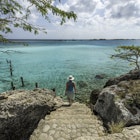The Caribbean island of St Lucia is home to luxuriant rainforests, sun-drenched beaches and the staggering Pitons twin peaks. Yet having a wonderful time in this tropical paradise is possible without spending a fortune.
While the island's posh resorts and gourmet restaurants make it easy to be lured, St Lucia can be a budget traveler's dream. Explore cultural institutions, dive into local Creole cuisine, and enjoy lively street festivals – all without breaking the bank. Here are some recommendations to help you enjoy the beauty and charm of St Lucia without the hefty price tag.

Average daily costs in St Lucia
- Basic room for two: US$30–50
- Self-catering apartment (including Airbnb): US$50–150
- Public transport ticket: US$1–3
- Coffee: US$5
- Sandwich: US$5
- Dinner for two: US$10–30
- Beer/pint at the bar: US$6.50
- Average daily cost: US$200–450
1. Use public transport to get around
Minibuses are the primary means of transportation in St Lucia. These are privately operated and serve all 10 of the island's districts. It's an inexpensive way to navigate the island. The standard fare for a short trip is about US$0.50 (XC$1.25), while a longer journey will cost US$4 (XC$10). US dollars and euros are accepted, but the use of local currency is strongly encouraged.
Signal for a stop by waving your hand near the designated areas on the roadside. The driver will direct you appropriately if you let him know where you are going. Buses travel various routes throughout the week but are infrequent on Sundays. Green license plates with the prefix ‘M’ indicate the bus is an authorized service.
2. Eat at local restaurants
Eating out can quickly get expensive, especially in upscale areas like Rodney Bay. Venture into community restaurants frequented by locals instead and you’ll not only save money but eat some of the island’s most delicious and authentic food.
Located only five minutes from Rodney Bay, Gros Islet is the northernmost village on the island. The brightly painted wooden cottages lining the roadside serve classic St Lucian stews and grilled fish, plus international favorites like burgers and fries. Hang out at watering holes such as Irie Bar, Bar One and Bayside Chillerz close to the seafront and enjoy a cold Piton beer.
At the southernmost tip, in Vieux Fort, popular haunts like Island Breeze and Coastline Beach Bar near Sandy Beach serve refreshing drinks and sumptuous food. Be aware that restaurants near resorts and cruise ports tend to charge more because of the high volume of tourists who dine there.

3. …or shop for supermarket meals
Stop by Massy Stores for local meals at affordable prices. The supermarket chain typically offers pre-packaged lunches, including the national dish of green fig and saltfish, scalloped potatoes, cow heel soup, pelau (traditional rice dish with chicken or beef, pigeon peas and coconut milk), and ground provisions (a Caribbean name for traditional root vegetable staples such as yams, sweet potatoes and cassava), among lots more.
Rotis, chicken and beef patties, sandwiches, and pastries are also available. You can also pick up portioned meats and sides to create your own feast. Prices range from US$6 to US$8 (XC$15 to $20).
4. Consider villas and apartments for accommodation
There are plenty of places to stay in St Lucia that cost less than US$100 per night. They might not be dripping with the amenities of a five-star resort, but they make up for it with coziness and an air of authenticity. Many of the villas are hidden away and offer stunning views, plus staying in a rental with a kitchen means you can save even more by stocking up on ingredients at the grocery store and cooking for yourself.
5. Lean into the rainy season
The hurricane and rainy season in St Lucia is from June to November. There are often better deals on hotels and resorts if you are willing to travel during this time. Storms do occur, and they can be quite powerful, but they tend to pass through the area quickly and have little lasting impact on the island experience. Recent years have been relatively hurricane-free for St Lucia, but anyone planning a trip during the wetter months should monitor the forecast closely.
6. Fly into the larger airport
There are two airports on the island of St Lucia: Hewanorra International Airport (UVF) and George F.L. Charles Airport (SLU). Both welcome international airlines and direct flights from North America, Europe, and neighboring Caribbean islands.
Flights into Hewanorra tend to be cheaper on major airlines such as American Airlines, Delta Air Lines, JetBlue, Air Canada, and British Airways.

7. Take ferries to nearby islands
If you’re lucky enough to already be visiting one of the stunning islands near St Lucia, traveling by boat is one of the most cost-effective ways to get here. L'Express des Îles runs a ferry service from Dominica, Guadeloupe, and Martinique to St Lucia several times a week.
Depending on your starting point, the trip can take anywhere from an hour to 4½ hours. The ferries operate year-round, with increased frequency in the summer. Traveling on a round-trip on one of the fast catamarans from St Lucia to any of the three islands above can cost as little as US$105.
8. Find free and low-cost activities and tours
St Lucia's beaches are open year-round and are usually free to the public. Some of the more popular spots include Reduit Beach and Pigeon Point in the north, Vigie Beach, five minutes from the capital city center, and Sandy Beach in the south. Anse la Voute, also known as Five Dollar Beach, sits on the rugged northeast coast and is ideal for barbecues. Access to the picturesque beach costs US$2 (roughly XC$5), which goes towards its upkeep.
A private white-sand beach sits just inside the Pigeon Island National Park entrance and is open to visitors. Adults pay US$10 (XC$27) to enter the park, while children aged 5 to 12 pay US$3 (XC$8). The park also houses the historic Fort Rodney and Signal Peak hilltops and multiple artifacts.
While most tours are self-guided, guided tours cost US$20 (XC$54) for a group of up to five people. Many other local landmarks and attractions are free to explore, including the Castries Market, Derek Walcott Square and The Minor Basilica of the Immaculate Conception.
Local tip: Buy tickets to major attractions on site to get the genuine price. Some websites may appear official but are run by tour companies upselling their services. Taking a taxi (or public transportation, depending on where you’re coming from) and having the driver return at a specific time is often more cost-effective than paying for an organized tour.












